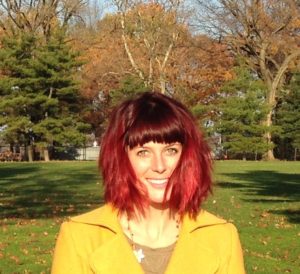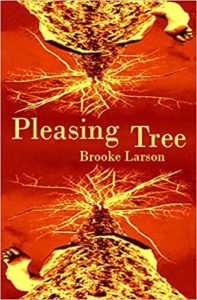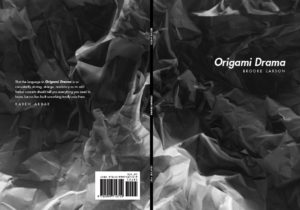 Today’s guest post is by Brooke Larson, a writer, collagist, and sometimes wilderness guide. She holds an MFA in Creative Writing from Columbia University, and is finishing a PhD in English at the University of Louisiana at Lafayette. Her collection of essays, Pleasing Tree, was published in March by Arc Pair Press. A chapbook of her poem-plays, Origami Drama, has recently been published by Quarterly West.
Today’s guest post is by Brooke Larson, a writer, collagist, and sometimes wilderness guide. She holds an MFA in Creative Writing from Columbia University, and is finishing a PhD in English at the University of Louisiana at Lafayette. Her collection of essays, Pleasing Tree, was published in March by Arc Pair Press. A chapbook of her poem-plays, Origami Drama, has recently been published by Quarterly West.
Here is a selection from a forthcoming Dialogue review of Pleasing Tree, by Amy Takabori.
Larson’s interactions with trees and other earth things are central to her “earthling” wanderings through the Arizona desert, New York City parks, and Israel in her collection of personal essays, Pleasing Tree. Throughout, Larson masterfully balances humor with profundity, using her insights into plant processes to explore questions like “how did I get here?” . . .
Ultimately, Pleasing Tree is written by and for wanderers searching for meaning. She asks, “How did I get here?” and the answer seems to be “by contrasts.” We need absence to highlight presence, she contends. We need silence so we can hear. Plants need dark periods to get nutrients from the light. It is by getting lost that we can find ourselves. After walking through desert and beauty and loneliness and light, Larson beams hopeful. “And sometimes I feel it, when I’m filthy through and through with my own blackblue heartguts: the world is pleased with me. I am doing human alright.”
 At 15 I was dropped off in the Arizona desert with two homeless-looking people holding machetes. Over the next 7 weeks I would hike 100 miles of jagged wilderness, learn to build primitive shelters, make fire rubbing together sticks, sweat in hot houses made of willow, and come to see myself and my world wildly differently. I would later come back to the desert to work, on and off for almost a decade, as one of those lost-looking guides for the same wilderness therapy program. My book Pleasing Tree, a collection of essays and prose poems, grew out of these experiences. It offers a wayward exploration of the human relationship with wilderness, as seen through the lenses of science, religion, poetry, and personal narrative. It is also about trying to survive the chaos of cities and human relationships. Interwoven with these stories are the lives of plants. Like wilderness therapy, plants—their intelligence, rhythms, antics, and mysteries—offer ways of viewing the self and others in new ways. While the reader will encounter earnest seeking and serious research, I think there’s always some kind of spiritual slapstick in trying to understand our world. So the reader will also encounter piss and blood and excrement. What follows are a few excerpts from the book.
At 15 I was dropped off in the Arizona desert with two homeless-looking people holding machetes. Over the next 7 weeks I would hike 100 miles of jagged wilderness, learn to build primitive shelters, make fire rubbing together sticks, sweat in hot houses made of willow, and come to see myself and my world wildly differently. I would later come back to the desert to work, on and off for almost a decade, as one of those lost-looking guides for the same wilderness therapy program. My book Pleasing Tree, a collection of essays and prose poems, grew out of these experiences. It offers a wayward exploration of the human relationship with wilderness, as seen through the lenses of science, religion, poetry, and personal narrative. It is also about trying to survive the chaos of cities and human relationships. Interwoven with these stories are the lives of plants. Like wilderness therapy, plants—their intelligence, rhythms, antics, and mysteries—offer ways of viewing the self and others in new ways. While the reader will encounter earnest seeking and serious research, I think there’s always some kind of spiritual slapstick in trying to understand our world. So the reader will also encounter piss and blood and excrement. What follows are a few excerpts from the book.
*
from the essay “Ecology of Absence” (First published in Dialogue, Winter 2016).
Desert as a moral and social guide is not a breakthrough of modern psychology, new coat of “wilderness therapy” notwithstanding. Jesus and Muhammad spent significant time in deserts, and Moses, poor Moses, couldn’t lead his people any other way.
The story of Abraham begins without preamble: Get lost. Go forth from your native land, from your birthplace, and from your father’s house to the land that I will show you. Come undone in the desert. Leave everything you were about to be for nothing you could say with any certainty. Become other, which is finally you.
Lekh lekha—literally, Go to yourself.
The Book of Mormon starts with a family commanded to leave iniquitous Jerusalem and enter the barren desert. They must uproot, reorient, begin again. The people carrying this book split from American society to set up their own State in the wilderness.
Intrinsic to desert is testing ground. It is where humans go to either escape from or conceal extreme corruption. The story across time/space: Man leaves behind the comfort and spoils of society and turns toward an indefinite integrity. He takes to the blank of the desert to re-imagine what man is about. He writes. The words sink into dust. We who are made of dust take to translating them.
–
When I first started TrailWalking for ANASAZI, I wanted to be put with the boys. They’re stronger, I concluded, lazily. They’ll be faster hikers, better fire-makers. Gradually I learned my mistake. Ask any TrailWalker who has been there and back with both groups, and they’ll tell you the same thing: The girls have the most endurance. This is the truth of my women ancestors crossing the desert with their homes tied up in wagons, children on their hips, the husband ahead or behind. I didn’t come to their stories until later. Women to me are the long run surprise.
One of the aims of the Mormon colonizing expeditions of the 1870s was to establish peaceful relationships with the Natives. This meant traveling through Navajo territory—tough, red land. White heat. Black winds. In our family history journals from this expedition I found the story of one of my foremothers giving birth on the rocky backbone between the Colorado and San Juan Rivers. When the family reached a plateau, a blizzard was raging, and exposed to the wild winds and snows, the woman went into labor. The husband tried to pitch a tent as she pushed. As the baby emerged a hard slapping wind came and blew the tent upward. The woman reached up and held the pole down with one hand, the baby, now, in the other.
The desert is full of holy tents full of holy men and holy smoke of manly meats for the man god behind the curtain. But when I hear the Lord dwelt in a tent, all I see inside is my foremother using her body as a stake as she pushes out human life.
–
Give any slob a compass and a machete and they’ll look all business. The desert is maybe the only place where the more rugged you look, the more professional you seem. With my pink tentacles of greasy hair, rainbow button-up shirt complete with duck tape patches, and wool pants with a wide smile of stitches across the ass—I look masterful.
The truth is, I’m bad with maps. The problem is deeper than that: I am spatially handicapped. I always have been. I exist in a geographical blackout. It does not matter how long I stare, I cannot match a squiggle on the page to a ridge on the land to save my life, which is the point. I am a wilderness guide after all. What complicates matters even more is that I cannot locate the direction of sound. I have only one ear that hears. ANASAZI uses a hooting system—a very distinct yawp—to communicate and navigate within and between Bands. This can prove crucial if, say, the group gets split up for whatever reason and you must find one another in a vast and hairy landscape. You don’t want to go up the wrong mountain. Which is exactly what I have done. It’s shameful. Is that a hoot? Watch my good ear spin in circles to catch it, a dog chasing its nub of tail.
So how have I gotten this far? Moderate wits, fat luck, and, unfortunately for my group, endless trial and error. Fortunately for me, they don’t know that. Circles in a barren place are hard to recognize. The desert is discreet.
I have taken our group to the wrong cow tank, and it is dry, and we are out of water, like we have been since yesterday. Everyone is in bad shape. Cooked brains and sandpaper tongues. We’ve dropped our packs on the cracked mudbank and are resting our aching backs of wasted wet against them. No one says anything. Rebecca picks up a rock and scratches big letters into the dry skin of her arm: S-E-X. Someone must have another idea.
–
Another ancestress of mine gave birth in a tent in the desert. She was a second wife. Part of an outlawed but covenant union. There is no heavenly hurt quite like a commanded threesome. Following the exodus from Mexico, the fugitive family stopped long enough for her to give birth to a son in a government tent. There, a few days later, she was abandoned by her husband, his other wife and their family, and left with a young daughter, a newborn, and a desert. She and her children never saw her husband again. She chose to make that desert and solitude her home, refusing to move, refusing to remarry, calling it her life.
Stories repeat in the desert. Wives turn each other out, houses split, lines continue. Hagar weeps, God sees, wells appear, histories proliferate. And descendants plumb the murky depths.
It wasn’t until my grandma was an adult with her own family that she discovered her mother had been part of a polygamous household. The second wife had never been spoken of. As the secret cracked, bit by bit, correspondences opened between the families. It was found that the two wives, in their old age—husband long dead—had written letters. “As I look back over the years I think of those days we lived together. We were so closely associated and had trials and many things came up which could have been avoided if only we had been more patient and kind…. Eva dear, with all my heart and in deep humility I ask you to forgive me, that we may live in unity, love and happiness in the hereafter.” Sarah and Hagar never met again. But in the 1940s and 50s they sent postcards across the desert between them.
In the desert, stories repeat until they change. Echoes bring the rockslide.
Wilderness doesn’t allow for guides, only seekers. No person—whatever their age or expertise—is beyond growing pains. Everyone is learning their limits, and tripping past them.
A mom came out for Family Camp—the two-day reunion on the Trail of child and parents—and pulled a ballistic kid stunt: she ran away. The desert drove her nuts. She tried to book it for a road, any goddamn road. A TrailWalker recently hopped in the emergency vehicle before the week’s end and refused to get out. Two months from now, dear Gabe, according to his own Walking, will have an epic freakout, to be named The Vanishing, and will not return for six months.
Self-discovery is not a transcendent journey. It’s a private tantrum in a public place where you are both child and parent. The desert is space to let it all play out. With as little intervention as possible. Go on and kick and scream and cuss and throw that stupid pack down a hole and spit on it like you mean it. The desert won’t flinch. It only makes picking it back up unavoidable.
*
 from the essay “Piss on Heartsick”
from the essay “Piss on Heartsick”
I am a recreational urban urinator. What started as an emergency has since bloomed into intimacy, for cities of 8 million people are not kind to girls with bladders the size of walnuts, so that such a girl has a decision to make: to potty-dance through life, or to engineer a certain cat-sharp awareness of her surroundings—the dark corners, closest parks, the widest bush, the unlikely, barracky, and abandoned. Originally from the exposed, scant-shrubbed desert, I had a knack for sleuthing out coverage. Yet it remained a craft of last-resort, a tight-spot art. Nothing to be cultivated for its own sake. No, it wasn’t until last year—winter, heartbreak—that I suspected I wasn’t just taking care of business. Pissing openly was doing something to me.
Living in a hard-assed city has only made the surrender more crucial. It happens that there is something about making your body small and low that lays claim to something big and old. I’m not talking about that manly genre of urinating in sweet nature. I mean pissing against the jagged nature of a city, where to make a body vulnerable to its environment is to subvert its environment. You are literally the flesh among steel, the fluid in the gravel, a crack, if you will, in the system. You are a woman, and your body has ever been unstoppably itself. It has been bloody and pissy and bloated in turns, and it fills you now with wonder to let yourself go, right through the cracks of the gum-pocked cement and into some softness of deep-down dirt. And if it is dark out, and there are black tree branches wiring the sky, and a distant rush of cars like a cold river, and maybe a moon, like a flap of skin that makes you suck in your breath, then, on those nights, with my naked backside seated on air and riding a breeze, I feel as if the world is pleased with me. Pissing is not a choice, but here I have chosen to make it part of something beyond square walls, to look carefully around and up and down and side to side to get down low as a prayer and be this body as honestly as I can. I always look first. Left right left sky dirt. As if my body is a child I’ve taken in hand to cross soundly to some other side, and you passing by, I don’t want to cause you to harm me and I don’t want to harm you, so I do it deftly, alertly, no derring-do, no up-yours. I respect you, stranger. You are part of the secret orientation of my pissing, along with the trees and the shadows and the buildings. And it is from this my small bare place among you that the feeling arises that I have done alright. The rush comes. I am pleasing in the sight of the world that hides me.
Here are two blurbs written for the book:
“Pleasing Tree is a natural history of Larson’s vagrancies: guiding YoungWalkers in the Sonoran wilderness, drinking an Amazonian psychotropic herb on Rockaway Beach, falling in love with a dewdrop above Salt Lake City, pissing in the canyons between the buildings in Manhattan, or walking with an Armenian-Palestinian in Jerusalem’s Christian Quarter. While there are stories here, Larson never allows them to unfold in a straight line. Instead they ramble like her footprints—a crooked braid. Experience as viewed through lattices, the branches of a tree or the reticulations of the cultures she’s adopted. Her language tumbles like a creek, dances like a flute player. Words conjoin and re-conjoin, kinky: facial beehive, piss alchemy, pan-species foreplay, sopping bloodknot, twilit bullshit. This frolic across landscapes, cityscapes, and inscapes is purposeful play, exploring desert blandness and urban loneliness, seasonal affective disorder and communion with plants, the plight of Palestinians and of lovers, the science of stomach bacteria and the mysticism of light and water. As she writes, ‘The world is obscene with meaning.’”
~ John Bennion, author of Falling toward Heaven and An Unarmed Woman
“Brooke Larson’s Pleasing Tree is a pilgrimage through landscape and thought, an ecstatic meandering most beautifully wrought, visionary in its wandering. In this deft collection of essays branching with the largess of cellular star stuff, Larson’s writing jolts so expansive it becomes difficult to see the world without a shimmering awareness mystifyingly close.”
~ Rebbecca Brown, author of They Become Her and Mouth Trap
